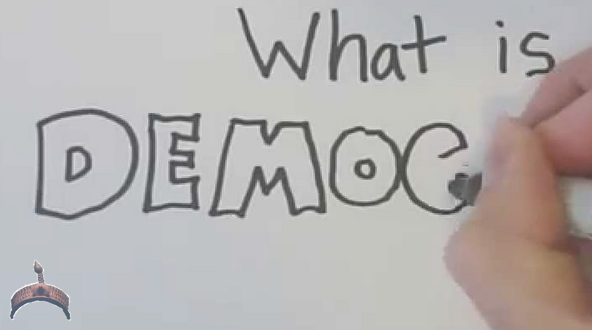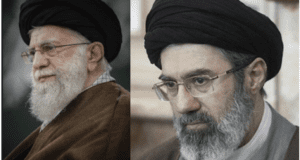by Arturo Íñiguez
If I say that none of us lives in a democracy, no matter which country we are coming from, I am sure that most Ooduarere readers will agree. But then, if I ask how would a democracy look like, I am doubtful I will get such a unanimous answer. However, in order to bring change by convincing other people to ditch this system and try something else, we need to have first and foremost a clear view of where we want to go.
What does democracy mean? The typical answer to this question, that democracy means people’s power, is the first trap we must avoid. Why? Because that answer is completely useless. Any defender of the current system will tell you that the people have the power to vote the government out, and it is thus a democracy… which we know it is not. So, we need to dig deeper.
First of all, however, we have to understand that ‘democracy’ is possibly the most misused word in the world today. For many people, it describes all that is good, fair and noble. When a politician or a news anchor says that terrorism is a threat to democracy, what they actually mean is a threat to the rule of law or a threat to our liberties. Democracy, as we will see, has a much more precise and concrete meaning. Please keep this in mind as we begin our search.
Why are words created? A new word is coined when a new reality is born, and only then. To understand the meaning of a word, we have to look at the object it first named. If you tell me that the word ‘television’ means ‘sight from afar’ you won’t be of much help. I know that ‘telescope’ also means ‘sight from afar’, and I can easily tell apart a television and a telescope, since they are quite different. ‘Sight from afar’ is not the meaning of any of these words because it doesn’t give us any useful information about the objects they name.
The word ‘telescope’ was created by Galileo in 1609 when he aligned two lenses: the objective and the eyepiece. Later on we had mirrors, and much later radiotelescopes and others, but it all started with two lenses. ‘Telescope’ doesn’t therefore mean ‘sight from afar’ (which is meaningless anyway), it means ‘linear arrangement of two lenses”. Similarly, the word ‘television’ was coined by Telefunken in 1934 when they first commercialized a cathode ray tube. Nowadays we have plasma and LCD screens, but the original meaning of the word ‘television’ is ‘cathode ray tube’ and nothing else.
So, when was the word ‘democracy’ first used? We know it described the changes to the existing constitution of Athens introduced by Cleisthenes is 508 BC. And what were these changes? Certainly not the participation of all citizens, no matter how poor, in the Assembly, since that had already been granted by Solon almost a century earlier, in a constitutional arrangement that was called ‘timocracy’ (from the Greek timé, meaning honor). But before I explain to you which was the real innovation brought in by Cleisthenes, please bear with me a hopefully not too boring discussion about political regimes.
There is plenty of classifications and typologies out there. I have looked at many of them and always found them wanting; that’s why I ended up devising my own. Don’t worry, it is quite simple. The first distinction to be made is between authoritarian and participatory regimes. Think of a group of hunter-gatherers: either they adopt their decisions by some kind of consensus, either there is leader or a small group who decides and the rest obey without questioning. Authority may be based on brute force (in which case we can call that regime totalitarian), but not necessarily: think for instance of the Iranian ayatollahs, whose legitimacy is based on moral and religious grounds.
Participatory regimes can take the form of direct government when all the decisions are adopted by the whole group of citizens assembled together. The alternative to a direct government is a representative government, when a subset of citizens representing all the others take decisions in their name. If we go back to our Athenian friends, we can see that their constitution was a combination of direct and representative government. Since the Assembly could not be summoned every other day because most citizens had better things to do with their lives, they instituted a permanent Council that took care of ordinary matters.
Under Solon’s timocracy, the so-called Council of the 400 was an elected body. Cleisthenes spark of genius was about to change that. He had observed that those who were elected were always the ones who were more eager to seize a position of power, and that they always used it in their own benefit and not for the common good. More than a century later, Plato will sum up this fact by writing that the worst that can happen to a society is that offices are hold by those who crave them most. But this is exactly the problem with elections: you have to be an ambitious person in order to be a candidate. French philosopher Alain famously said that what characterizes a honest man is not wanting to rule over others, which implies that, by elimination, it will be the less generous among us who will always take advantage.
Faced with this challenge (how to select a subset of citizens who represent all others but avoiding those that want to be elected the most), Cleisthenes found an original solution. He introduced a new Council of the 500 whose members would not be elected but alloted. A machine called kleroterion was carved in stone and used to randomly select the names of the citizens that would sit in the Council for the next year on behalf of the different demes, territorial divisions comprising a neighborhood or suburb of Athens, or a village or hamlet in the countryside surrounding it. As you would expect, not everyone was happy with this innovation. The rich citizens in downtown Athens, who were used to win at every election, ridiculed the new system calling it ‘rule by the deme’, which in today’s terms will be the equivalent of ‘rule by the redneck’. The same root can be found in the word ‘demotic’, which refers to the vernacular form of the Greek language as opposed to the literary form exclusively used in selected and cultivated circles.
At its origin, therefore, the word ‘democracy’ did not mean ‘rule by the people’, if only because the very notion of ‘people’ as a group of individuals with shared political rights had not yet been conceptualized at the time; in a way, it had just been given birth. When the poorer Athenian citizens turned the tables on the rich and proudly accepted the moniker thrown on them, they started calling the new system a democracy to differentiate it from the aristocratic system practiced in other city-states, like Sparta, that went on electing their councils.
So there you have it: in exactly the same way that telescope means ‘alignment of two lenses’ and television means ‘cathode ray tube’, democracy means ‘alloted political offices’ and nothing else.
We can now expand our classification one further step: representative regimes can be either aristocratic, if they rely on election, or democratic if they rely on sortition.
According to my experience, a lot of people, when exposed to these truths, will react in complete denial. But the fact is that this has been completely trivial knowledge for political scientists for most or recorded history: from Plato and Aristotle to Montesquieu and Rousseau, in the mid XVIIIth century, all of them wrote the same: elections are aristocratic and sortition is democratic. How come, then, that we have been so thoroughly indoctrinated as to believe the exact opposite of something that was crystal-clear for the greatest human thinkers?
Well, the change began in the late XVIIIth century, when the rich bourgeois in France and North America decided that they would be better off in the future by breaking free from the existing monarchic regime (which after all had not been so bad with them, or they wouldn’t had got so rich in the first place). Needless to say that sharing any power with the poor masses was always completely out the question. The masses would be used to fight the royal armies and then abused into thinking the the victory was also theirs. Both the Founding Fathers and the French revolutionaries were adamant in opposing democracy. Suffice to read what they said and wrote to understand that democracy was for them a very bad and ugly word.
But calling their elective system aristocracy, which would have been the logic thing to do following the philosophical tradition we have just mentioned, was also a no-go. Was not the aristocracy the despised enemy recently destroyed? And at the end they had to settle for a word like ‘republic’, an empty signifier which can mean anything you want it to mean.
There is nothing wrong with the original meaning of the word ‘aristocracy’. Etymologically, it comes from the Greek aristos, ‘excellent’. Government of the best, thus. Plato, who abhorred democracy, preferred aristocracy above all other regimes. Things started to go down when aristocracy become hereditary and, as Rousseau put it, we saw twenty-year-old senators. Rousseau differentiated three kinds of aristocracy: that of age, or natural aristocracy, that we can still find in many of the so-called primitive tribes (as if we were civilized!); that of blood, or hereditary aristocracy, which he considered the worst of all systems of government, and that of merit, or elective aristocracy, which he considered the best.
Personally, I favor sortition instead of election as the method to designate representatives, but I can accept that other people may prefer election. I don’t have any problem with that. But I do have a problem with people calling elections ‘democratic’. They remind me of that guy who went to the doctor and told him: “My family is always complaining that I cannot pronounce the word ‘bridge’”. “Say it again”, says the doctor. “Bridge”. “Be completely reassured that you have no problem whatsoever: you say that word as well as anyone”. The guy then goes home and tells his child: “Johnny, dear, be a love and bring daddy a bag of almonds, a big glass and one of those beers in the door of the bridge”.
This was, indeed, the last chapter of our story, the one that definitely set the trap in which we are prisoners still today, not knowing how to scape: the gradual shifting – from immensely negative to immensely positive – of the connotations of the word democracy, in the course of a few decades. The trouble with elections, you see, is that you have to run and win. And as any expert in marketing, electoral or otherwise, will tell you, nothing can beat a good brand. Andrew Jackson had tried and failed in 1824. In 1828 he finally found the branding he had been looking for all those long years: the Democratic Party. The party of the people! Who could oppose that? And of course he won, not once but twice.
Up until now, I haven’t said anything new. It may sound new to many people, but these are simple truths that have been always there. Hidden in plain sight, so to say. Of course, we are conditioned since our earliest childhood to never see those truths. ‘Democratic elections’, we hear again and again, as if that was not an oxymoron, a contradiction in terms. Elections are aristocratic and sortition is democratic – unless, that is, Plato, Aristotle, Montesquieu and Rousseau were all wrong.
This is an uphill fight, I am well aware of it. Those who benefit from the current regime of elective aristocracy only have to keep repeating their lies, while we have to make a huge effort to explain to other people around us what is the true meaning of democracy. But I am afraid that it is also our only chance to scape their trap and regain the good lives we all deserve.
This article is posted under the Coloriuris yellow licence
 Ọmọ Oòduà Naija Gist | News From Nigeria | Entertainment gist Nigeria|Networking|News.. Visit for Nigeria breaking news , Nigerian Movies , Naija music , Jobs In Nigeria , Naija News , Nollywood, Gist and more
Ọmọ Oòduà Naija Gist | News From Nigeria | Entertainment gist Nigeria|Networking|News.. Visit for Nigeria breaking news , Nigerian Movies , Naija music , Jobs In Nigeria , Naija News , Nollywood, Gist and more









